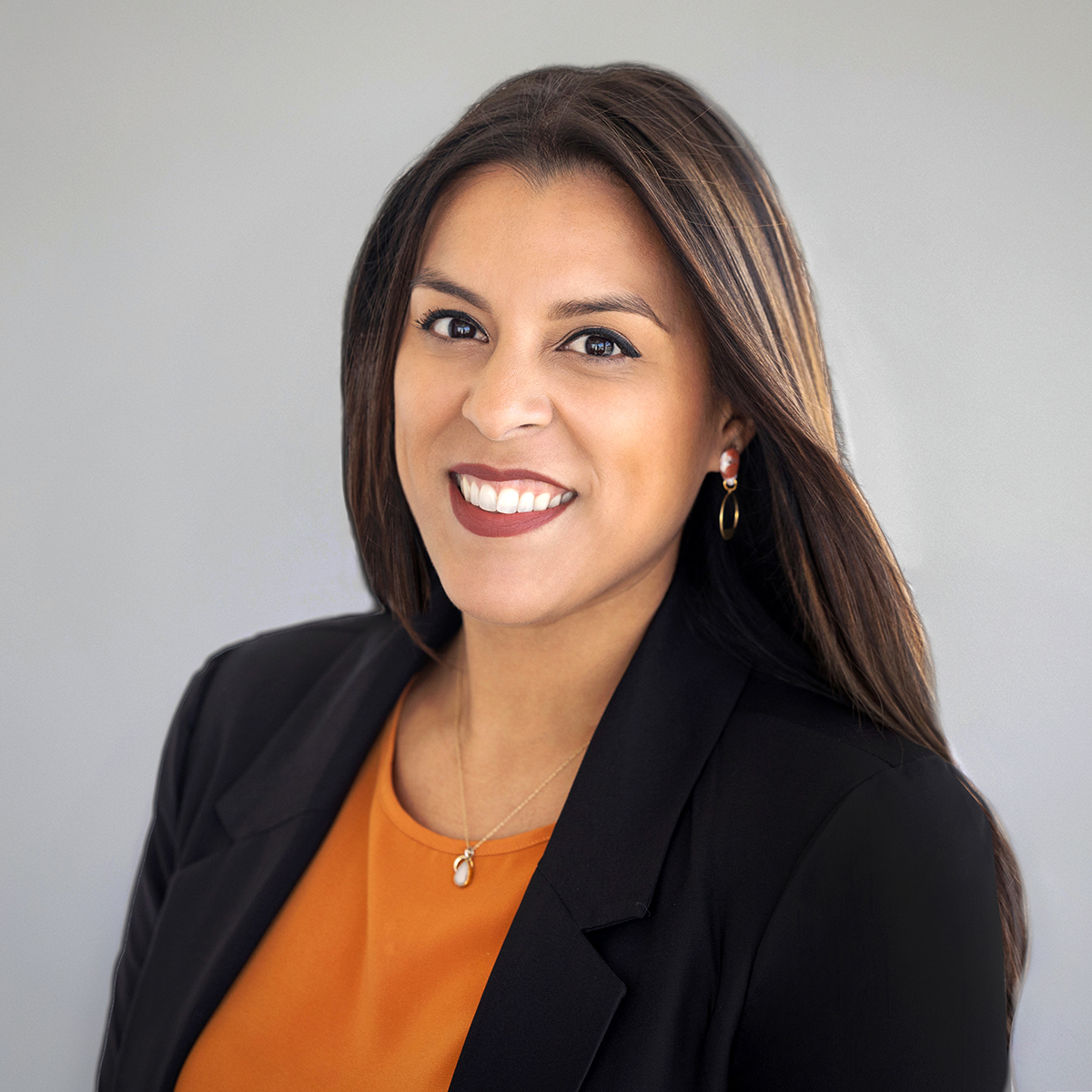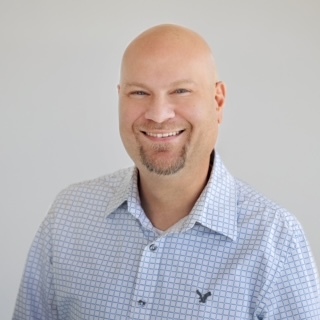
Alejandra Cabrera
Senior Program Manager
“When I work with people and communities I always think back to this sense of not belonging, and it drives me to continue to do the heart-work we need to do to advance health equity.”
Alejandra Cabrera’s journey to working in health equity started at a young age in her hometown of San Lorenzo, California. As a child of Guatemalan and Salvadoran immigrants, she felt disconnected from the community she was growing up with—feeling like an outsider that didn’t belong to a particular group. That upbringing instilled in her the desire to connect with and help others with similar experiences. Coupled with an early understanding of health inequities in her community, Alejandra knew she was destined to use her skills and drive to serve and work with underserved and historically marginalized communities. She worked in a variety of settings across California, including community-based organizations and clinics, counties, and research universities. Her experiences in these organizations only reinforced her belief that the inequities these communities faced were systemic in nature. She knew that the solution required breaking down and rebuilding the systems in place. This led her to HealthBegins, where she works as the senior program manager, helping Medicaid Managed Care Plans and health systems develop and implement organization-wide strategies, initiatives, and campaigns that aim to advance health equity and embed change through systems transformation.
When did you first recognize the reality of health inequities?
I feel like I’ve always kind of known. When I was little, I remember thinking, ‘People are treated differently because they look different. This doesn’t feel right.’ And then I think that feeling has always stuck with me. And that’s why I wanted to help people, and that led me to get my master’s in public health.
But when I really got this reality check was when I was working as a project coordinator at a community health clinic in San Diego, and I was working with individuals who were living with or at risk of HIV. And a lot of my work required intensive case management and day-to-day community outreach. It was just so heartbreaking to see that no matter how much people wanted to get better, no matter how much they wanted to go to the doctor, they couldn’t because there were all these barriers and challenges that they were facing. Like, ‘Where am I going to live?’ A lot of these people were unstably housed and thinking, ‘I’m focused on what I’m going to eat and where I’m going to live and not on going to see the doctor.’
What life experiences shape your understanding of health equity?
Being Latina, specifically being Central American. I grew up in an area where it was predominantly White families, and the Latinos that were there were Mexican. So, for me, I didn’t know where I belonged. I wasn’t sure if I belonged with the Latino kids because we didn’t really share similar cultural backgrounds, because the way we spoke was different, but then I also [didn’t fit in] with the White kids. It was hard. I always had this sense of ‘Where do I belong?’
Those experiences helped shape my understanding of the world—we live in a world that isn’t fair. And I know ‘life isn’t always fair,’ but everyone deserves to live a healthy, happy, and successful life. When I work with people and communities, I always think back to this sense of not belonging and it drives me to continue to do the heart-work we need to do to advance health equity.
Describe a problem that people involved in healthcare face, be they practitioners or patients, that you would like to solve.
I think the biggest thing is trust. There’s so much distrust right now between providers. and clinics, and then the community. As we work towards health equity and breaking down systemic racism [we need to] build back up that trust.
What do you find challenging about your work?
Stakeholder buy-in and engagement. When you want to break down systemic structures that weren’t built to really help historically marginalized communities in the first place, it’s hard to come in and say, ‘We need to break this down and build it back up, everyone.’ Internal stakeholder buy-in is key to creating systems transformation, but it’s what has been most challenging in my work.
What advice would you offer to others striving to advance health equity?
I would say it’s important to make sure that you’re taking care of yourself, because the work we are doing to advance health equity is hard work, and it requires a lot of our time and our energy. It’s important to take care of ourselves and make time and space to decompress, to process the things that we’re facing and dealing with on a day-to-day basis. Because if we don’t take care of ourselves, we can’t do the work that we really need to do to make a difference.
Tell us a little bit about the people who shaped your values.
Definitely my parents. My parents are immigrants from Guatemala and El Salvador, and they’ve always been really hardworking, very determined to succeed, and to give us the life that they didn’t have. So I definitely look up to them and value what they’ve taught me, which is to work hard for what you want even when the odds are stacked up against you, be brave enough to stand up and speak up for others, and to just make sure you’re always doing the right thing, even when no one’s looking. I think that’s a big thing that I will take everywhere with me.
Who inspires you?
My mom. She’s just such a hard worker and just has so much love to give and offer but she also doesn’t let anyone push her or boss her around. She’s a very independent, strong woman and she’s super resilient. She has gone through so many challenges and barriers in her life, but she has always overcome them. And so I look up to her and I hope to be half the woman my mom is.
What’s one thing you’re learning now, and why is it important?
I’m learning to slow down, pause, and reflect. I think it’s really important in my personal life and in work life to take a deep breath and relax. And I’m realizing that I need to do that not just for myself, but for the people that I’m working with, for the clients I support, and for the teams that I lead.
What was your first job? And what did you learn from it?
I was a tutor. When I was in undergrad at UCSC, I was a chemistry tutor for the Academic Excellence Program or ACE for short. I loved working for the ACE program because I got to be part of helping increase the diversity of students in STEM. That’s when I learned that I love mentoring and teaching people. I really love connecting with people and helping others achieve their goals and succeed.
What brings you meaning in your life, outside of work?
Art. I love art, immersing myself in art, whether I’m creating it or going to an art gallery or listening to music, just any form of art is my way of recentering myself.
What are your favorite films, books or podcasts?
I love Morbid. It’s a podcast. It’s kind of a funny one to listen to, but I like listening to it while I’m getting things done around the house. And I love books! I love all kinds of books. My favorite author is Elizabeth Acevedo. She’s a Latinx author. She wrote two of my favorites: “With the Fire on High” and “Clap When You Land.” They are young adult books but I recommend everyone read them.
If you were not working in this field, what other career do you like to imagine having?
I would love to have a career as an artist. Maybe painting murals or having an art exhibit somewhere. Something artsy where I can get crafty and be an artist every day of my life. I’m actually a jewelry maker now and would love to do it full-time one day. So I guess I’m already manifesting my dreams!
What’s a fun fact about you that many people may not know.
I love, love, love Frida Kahlo! I have a tattoo of her on my arm. I just love what she represents. I feel like she was complex. She was perfectly imperfect. And I feel like that really just represents who I am—perfectly imperfect.
Vsem Yenovkian is the Communications Manager at HealthBegins.
Featured Content
Staff Spotlight: Erica Jones, Following Her Path and Passion to Help People
“I wish people would try to advocate for themselves more, because I feel like there's this power struggle and people don't feel like they can.”
Staff Spotlight: Kyron Pierce, The Eagle Scout with a Passion For Helping People Lead Healthy Lives
“[Health equity] is very hard work and it might be some years for us to see the fruits of our labor, but it'll be worth it when you do produce it.”
Staff Spotlight: Alejandra Cabrera, Perfectly Imperfect Artist and Health Equity Advocate
When I work with people and communities, I always think back to this sense of not belonging and it drives me to continue to do the heart-work we need to do to advance health equity.


